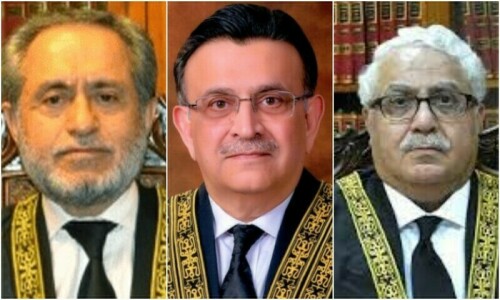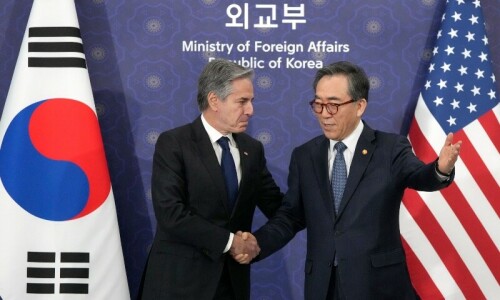• Decision expected on PTI chief’s plea in Toshakhana case; lawyer points out ECP’s ‘jurisdictional’ mistakes
• SC puts off similar petition until high court decision, seeks report on ex-PM’s jail conditions
ISLAMABAD: The Islamabad High Court (IHC) is expected to announce a decision in a case pertaining to the suspension of PTI chief Imran Khan’s three-year jail term in the Toshakhana case, as the Election Commission of Pakistan (ECP) is likely to conclude its arguments today.
Meanwhile, the Supreme Court on Thursday put off proceedings regarding the Toshakhana case till the decision of the IHC, saying it did not want to “duplicate the proceedings”.
During Thursday’s proceedings, the PTI chairman’s lawyer Latif Khosa argued before an IHC division bench consisting of Chief Justice Aamer Farooq and Justice Tariq Mehmood Jahangiri, focusing on three aspects: the release of Mr Khan owing to a short sentence, jurisdictional defects, and improper authorisation by the ECP.
The lawyer argued for Mr Khan’s release, saying that appellate courts could suspend such a short sentence even without examining the merits of the case. He added that President Arif Alvi on Aug 14 remitted sentences of prisoners and in light of this development, Mr Khan’s sentence was reduced by six months as well.
He argued that Mr Khan was now supposed to undergo two-and-a-half years imprisonment and the IHC could suspend his sentence. Mr Khosa further argued that the trial court did not examine the jurisdiction of the complaint filed by the ECP.
According to him, there was a jurisdictional defect in the complaint since the Election Commission was required to authorise an officer to file the reference. “In this case, the secretary of ECP authorised the district election commissioner to file the complaint,” he said.
He, however, said that the Election Commission has been defined in Article 218, which meant that the commission comprises the chief election commissioner and the ECP members. In this particular case, the secretary instead of the CEC or the ECP members authorised an officer, hence, the complaint was filed without due authorisation.
Mr Khosa further argued that the complaint must be filed before a magistrate who would refer the matter to a sessions court. “Sessions court cannot entertain the complaint directly,” he added.
Latif Khosa also said that the trial court judge “disobeyed the IHC’s directions and instead of examining the jurisdiction and maintainability of the complaint” convicted Mr Khan. He also pointed out that the Supreme Court also observed the verdict was passed in haste.
IHC Chief Justice observed that the court would look into the matter related to the ‘haste’ shown by Additional District and Sessions Judge Humayun Dilawar, administratively. Mr Khosa then went to the Supreme Court as the apex court was scheduled to take up the petition of Mr Khan at 2pm, which adjourned the matter without any proceedings, observing that it was still pending before the IHC.
ECP arguments
Mr Khosa then returned to the high court, where ECP counsel Amjad Pervaiz was rebutting his arguments. Advocate Pervaiz argued that the superior courts could suspend the sentence of those condemned prisoners who have at least completed 6 months imprisonment.
He pointed out that an accountability court awarded one year imprisonment to PML-N leader Capt Muhammad Safdar in the Avenfield Apartments case and the IHC suspended the sentence after three months. He said that Mr Khan has not even completed 20 days in prison. He argued that the matter of jurisdiction and maintainability has been discussed in detail in the trial court.
He pointed out that the counsel of Mr Khan did not impleaded the state as a respondent and added that the Supreme Court in 2016 ruled that the state must be cited as a necessary party in all the appeals against conviction. Mr Khosa objected to the ECP’s counsel arguments, saying that the superior courts have declared that the private counsel could be engaged in the cases where the advocate general recused to argue. On the court’s query, Mr Pervaiz said that he would take at least three hours to conclude the arguments on Friday.
‘Out of the blue’
But the SC took everyone by surprise as it ordered Attorney General for Pakistan (AGP) Mansoor Usman Awan to furnish an official report about the living conditions of incarcerated PTI chief Imran Khan.
Headed by Chief Justice of Pakistan (CJP) Umar Ata Bandial, a three-judge Supreme Court bench that had taken up Imran Khan’s Toshakhana case directed AGP to furnish the report by Aug 28.
Interestingly, the direction came even though the matter was neither discussed during Thursday’s brief hearing, nor was it pending before the court for determination.
During the hearing, the elder sisters of the former premier – Aleema Khan and Dr Uzma Khan – were also present in Courtroom No 1, as well as ECP-engaged senior counsel Ashtar Ausaf and Irfan Qadir
Since the Islamabad High Court (IHC) is seized with the matter where the proceeding was continuing and adjourned for Friday, the apex court decided to wait for the high court to hand down its final order.
On Thursday, the CJP also called for a representative from the Attorney General’s office in Courtroom No. 1. Since no one was present, the CJP observed that the order would contain a direction to furnish a report by the government about the living conditions of Imran Khan in jail.
The court, however, discouraged senior counsel Sardar Latif Khosa from sharing details of his meeting with Imran Khan in the jail. Still, the counsel was successful in blurting out some details, such as the presence of a uniformed police official during his meeting with the PTI chairman in prison.
‘Lower courts not subordinate’
Justice Jamal Khan Mandokhel – a member of the bench – emphasised that the high courts or the civil courts were not subordinate to the Supreme Court. They are independent and their independence should be respected, Justice Mandokhel observed, regretting that the respect of both the bench and the bar were dependent on each other. He did not seem happy over lawyers addressing press conferences targeting the judiciary.
At the outset, when the counsel appeared at the rostrum to say that he had rushed to the Supreme Court straight from the high court where he was on his legs at the rostrum, the CJP quipped you have “almost lost his breath”.
Justice Bandial observed that there was no need to duplicate the proceedings when the high court was hearing the case. When Justice Sayyed Mazahar Akbar Naqvi asked about the fate of the case at the high court, the counsel retorted that he was not a clairvoyant. “My job is to put in the best effort and it is the job of the court to do justice, the counsel said.
Published in Dawn, August 25th, 2023










































Dear visitor, the comments section is undergoing an overhaul and will return soon.